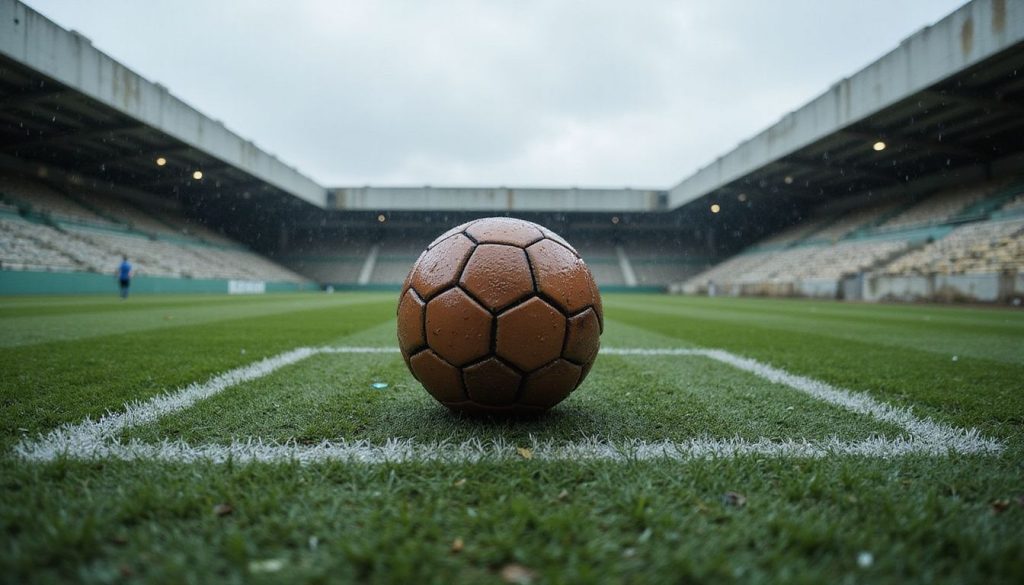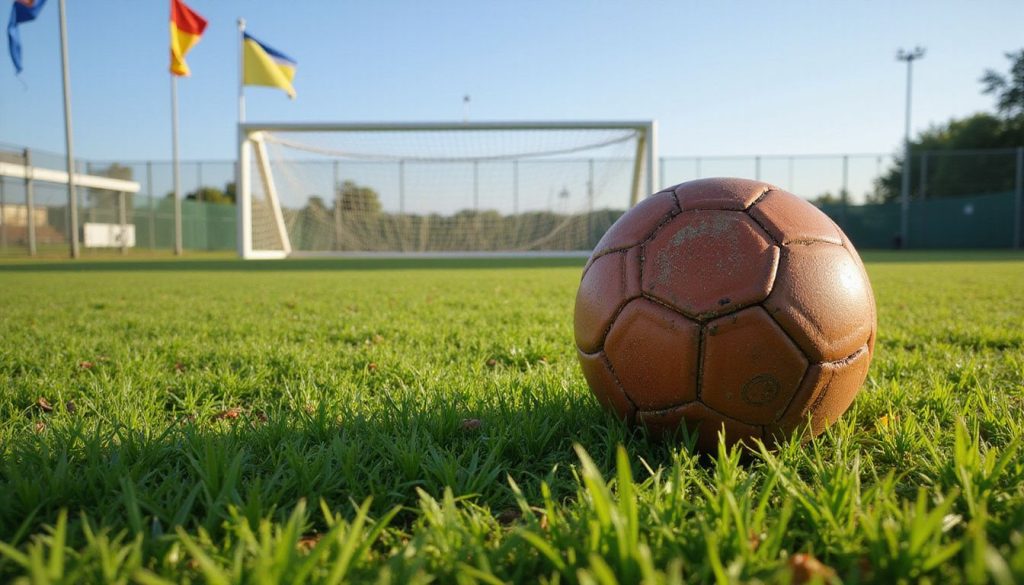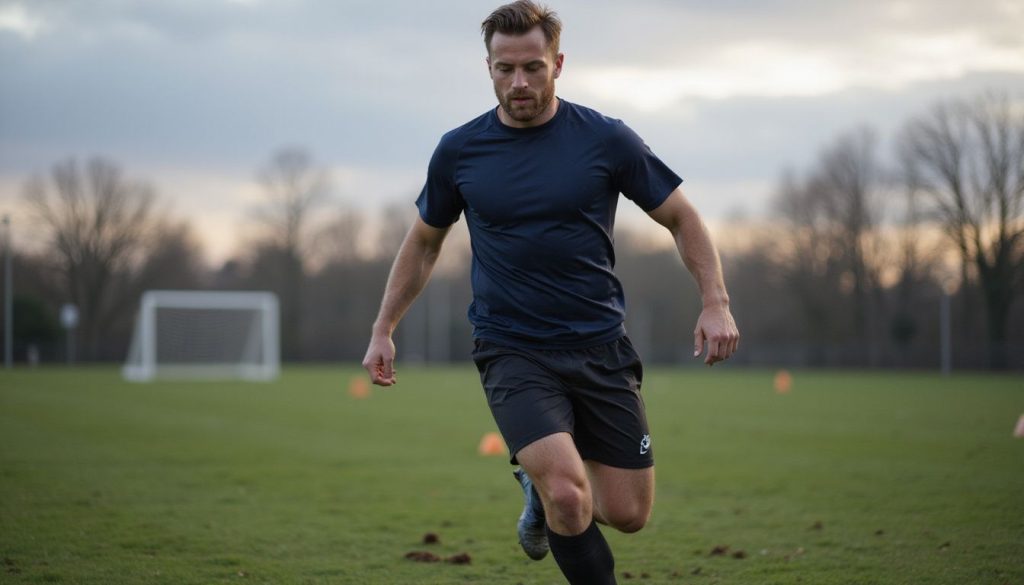Football Muscle Recovery Foods
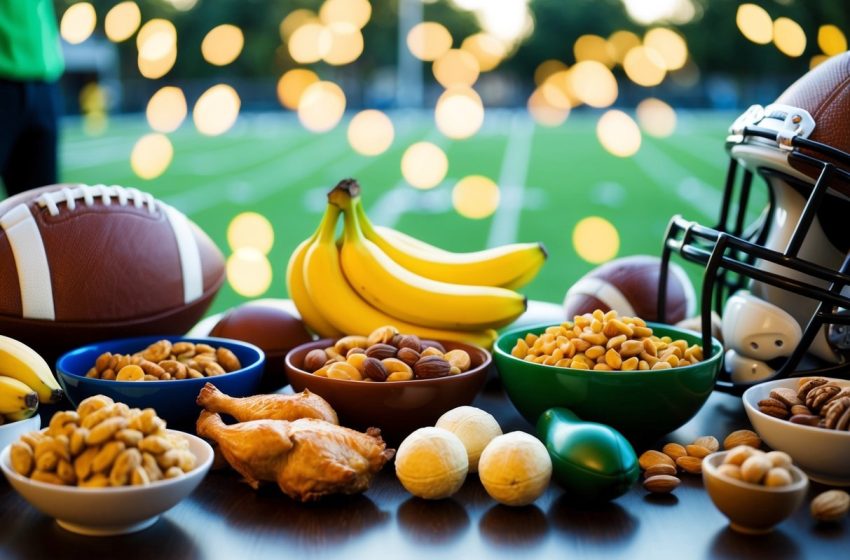
Football Muscle Recovery Foods: Nourishing Your Body After the Game
If you play football, you know how important it is to help your muscles recover after a tough match or practice. Your body needs the right foods to repair muscle tissue, restore energy, and get you ready for your next game. Eating the right mix of protein, carbohydrates, and vitamins can make a big difference in how quickly you bounce back.
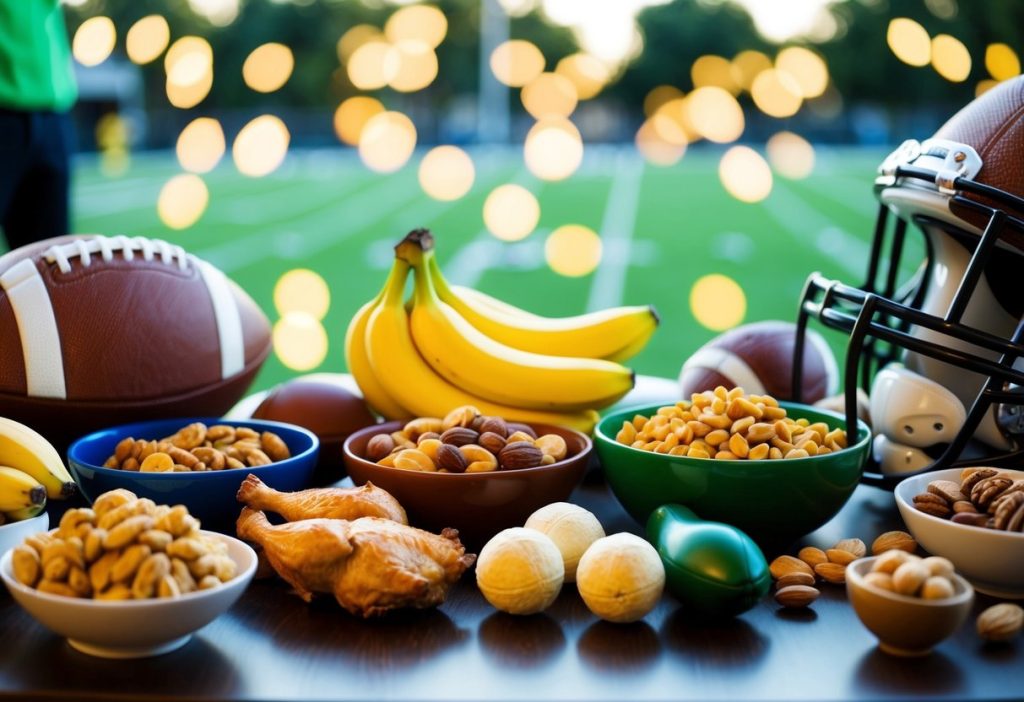
Your nutrition choices matter. Foods like milk, potatoes, beef, berries, and whole grains can help your muscles feel less sore and rebuild stronger. By paying attention to what you eat after playing, you give your body the nutrients it needs to recover well and support your performance.
Essential Nutrients for Football Muscle Recovery

Supporting your muscles after football takes more than rest. The right mix of nutrients in your meals can help repair muscle fibers, restore energy, and reduce soreness so you feel stronger and better prepared for your next game.
Protein and Lean Protein Sources
Protein is key for repairing and building muscle tissue that gets stressed during football. Eating enough protein helps you recover faster and promotes muscle growth. Aim for lean protein sources to keep your meals healthy while getting the amino acids your muscles need.
Some of the best options are grilled chicken, turkey, fish, eggs, and cottage cheese. Salmon is a great choice because it also has omega-3 fatty acids, which help with muscle soreness. Low-fat milk, Greek yogurt, and plant-based choices like lentils and tofu are also good for variety.
It can help to spread your protein throughout the day. Try adding eggs to breakfast, a turkey sandwich for lunch, and cottage cheese with berries as a snack after training.
Carbohydrates and Glycogen Replenishment
Carbohydrates provide the fuel for intense football matches and practices. After playing, your body needs to refill its glycogen stores that supply energy to your muscles. Choosing the right carbs supports this process and boosts your recovery.
Complex carbohydrates, such as whole grains, sweet potatoes, oatmeal, and quinoa, release energy slowly. This steady release helps your body rebuild and recover better than sugar-heavy foods. Eating some fruit, like bananas, after exercise can also help restore glycogen and provide potassium.
Rotating carb sources can make meals more enjoyable and ensure you get a wide mix of nutrients. Try a bowl of oatmeal for breakfast, or roast some sweet potatoes for dinner.
Healthy Fats and Omega-3 Fatty Acids
Healthy fats play a big role in muscle recovery by helping reduce inflammation and supporting cell repair. Omega-3 fatty acids are especially important, since they have been shown to lower muscle soreness after tough workouts.
Add fatty fish like salmon, trout, or sardines to your meals a couple of times a week for omega-3s. You can also use walnuts, chia seeds, and flaxseeds to boost your intake if you prefer plant sources. Drizzling olive oil on salads or vegetables brings healthy fats and adds flavor.
Watch out for fried or highly processed fats, as they can slow healing. Focus on whole-food sources for the most benefits.
Vitamins, Minerals, and Antioxidants
Vitamins and minerals are vital for muscle function and overall recovery. Calcium and magnesium keep your muscles working properly, while potassium helps restore fluid balance after sweating.
Get these nutrients through foods like spinach, dairy, and nuts. Antioxidants, like vitamin C and E, help fight off the cell damage that happens from hard exercise. Berries, especially blueberries, are packed with antioxidants. Add mixed berries to yogurt, toss spinach in salads, and keep some nuts for snacks to make it easy to meet your needs.
Eating a range of colorful fruits and vegetables increases your intake of these important nutrients and gives your immune system a boost while helping muscles heal.
Top Foods That Aid Muscle Recovery for Football Players

Eating the right foods after playing football helps your muscles heal, boosts your energy, and keeps inflammation down. Choosing smart sources of protein, complex carbohydrates, and anti-inflammatory foods supports faster and safer muscle recovery.
Best Protein-Rich Foods for Repair
Protein helps rebuild tiny tears in your muscles after exercise. You can get this protein from both animal and plant sources. Easy options include cottage cheese, eggs, and salmon. These provide your body with the building blocks needed for muscle repair.
Cottage cheese is high in casein, which supports muscle recovery overnight. Eggs have all the key amino acids your body needs and are quick to prepare. Salmon gives you not just protein but also omega-3 fats, which can lower muscle soreness.
Other great protein sources include:
- Chicken breast
- Greek yogurt
- Tuna
- Lean beef
Mixing up your protein intake*—having some from dairy, meat, fish, and plants—means you get a wide range of nutrients. Try to include protein at every meal, especially after training or matches.
Complex Carbohydrates for Energy Replenishment
Carbohydrates are your main fuel source during intense activity. After a game, eating complex carbs helps restock your muscles’ glycogen stores, which get used up while you play.
Whole grains are especially good for this. Items such as quinoa, brown rice, and oatmeal give long-lasting energy and provide fiber, vitamins, and minerals. Sweet potatoes are another top pick; they’re rich in vitamins A and C and won’t cause rapid blood sugar spikes.
Here are some complex carb options to include:
- Whole grain bread
- Oats
- Brown rice
- Quinoa
- Sweet potatoes
- Barley
Pairing these with a lean protein can boost muscle recovery even more. Try a meal like grilled salmon with quinoa or scrambled eggs with sweet potato.
Anti-Inflammatory and Antioxidant Foods
Intense football games cause small amounts of inflammation in your muscles. Certain foods help lower this response and speed up healing. Brightly colored fruits and vegetables are loaded with antioxidants, which protect your muscles from damage.
Berries like blueberries, strawberries, and mixed berries have powerful anti-inflammatory effects. Spinach, kale, and other dark leafy greens are also full of antioxidants. Eating these regularly may help you feel less sore and recover faster after matches.
You can add these foods to smoothies, salads, or as snacks:
- Blueberries
- Spinach
- Blackberries
- Raspberries
- Chia seeds
Adding extra fish or nuts to your diet gives you healthy fats that also help reduce inflammation. Keeping these foods in your meals supports your body’s ability to recover and get ready to play again.
Optimal Hydration and Electrolyte Balance

Keeping your body well-hydrated and maintaining the right balance of electrolytes can make a real difference in how quickly your muscles recover. Drinking enough fluids and getting important minerals help support muscle function and reduce fatigue.
Importance of Hydration in Muscle Recovery
Proper hydration is essential for football players because even mild dehydration can make your muscles cramp or slow down your recovery. When you sweat during practice or a game, you’re losing water and important minerals from your body.
Drinking water helps your muscles get the blood flow and nutrients they need to heal. It also helps carry waste products away from your muscles, which is important after tough workouts or matches. Sports drinks with electrolytes can help when you sweat a lot, but plain water usually works for less intense sessions.
Aim to drink water before, during, and after playing. Pay attention to signs like dry mouth, dark urine, or feeling tired, since these can point to dehydration.
Electrolytes and Their Food Sources
Electrolytes like sodium, potassium, magnesium, and calcium are crucial for muscle recovery and nerve function. When you sweat, you lose these minerals, so it’s important to replace them.
Common food sources of key electrolytes include:
- Sodium: Table salt, pickles, soup
- Potassium: Bananas, oranges, potatoes, spinach
- Magnesium: Nuts, seeds, whole grains, leafy greens
- Calcium: Milk, cheese, yogurt, leafy greens
For fast recovery after games, you can use a mix of water, sports drinks with electrolytes, and foods high in these minerals. Eating a banana or a handful of nuts is an easy way to help refill lost electrolytes and support muscle health.
Supporting Strategies & Lifestyle Factors

To help your muscles recover after football, pay attention to your sleep habits, use active recovery methods, and choose your meals carefully. These steps support muscle repair, lessen soreness, and keep you ready for each training session or game.
Sleep and Muscle Repair
Getting enough sleep every night is one of the most effective ways to repair your muscles. During deep sleep, your body releases growth hormones that help rebuild muscle fibers damaged during intense activity. Aim for at least 8 hours of quality sleep, and try to keep a consistent bedtime—even on weekends.
If you struggle with falling asleep, set a relaxing routine before bed. Turn off screens, keep your bedroom cool, and block out light and noise. Good sleep not only boosts muscle recovery but also improves reaction time, endurance, and focus, all of which are key for football players.
Active Recovery and Massage
Active recovery involves light movement after intense exercise. Try easy jogging, swimming, or cycling on your rest days instead of total inactivity. Gentle stretching or foam rolling also helps—this keeps your blood flowing, brings nutrients to your muscles, and cuts down on stiffness.
Adding massage to your routine further reduces muscle tension and soreness. Many elite athletes get massages after games or heavy training, but you can also use self-massage tools at home. Even a few minutes each day helps speed up muscle repair and supports long-term recovery.
Sports Nutrition Practices for Football
Football players have unique nutrition needs for recovery. Eat a meal or snack containing both carbohydrates and protein within an hour after games or training. Carbs help refill energy stores, while protein repairs muscle fibers.
Some foods stand out for muscle recovery, such as lean meats, fish rich in omega-3 fatty acids, eggs, and beans. Omega-3s are known to fight inflammation, which lowers muscle soreness. Stay hydrated by drinking plenty of water, and consider adding foods rich in vitamins and minerals to support overall health and repair.
If you have back-to-back games or hard training sessions, planning your meals and snacks ahead of time is important. You might also benefit from consulting a sports nutrition professional to fine-tune your diet for maximum strength, speed, and power.
Foods to Limit or Avoid for Optimal Muscle Recovery
What you eat after training matters as much as what you eat before. Some foods might slow down how your muscles recover or impact your performance the next day.
Sugary and Highly Processed Foods
Eating a lot of sugar or highly processed foods can get in the way of muscle repair. Foods with added sugar—like desserts, candy, sweetened coffee drinks, and some sports drinks—add calories but give very little nutrition for muscle recovery.
Processed items, such as chips, packaged snacks, and fast food, tend to be high in saturated fats and sodium. These ingredients do not help your muscles and might even cause inflammation, which makes soreness worse.
When you use sugary sports drinks for hydration, they can raise your blood sugar quickly but do not give lasting energy or help recovery. Drinking water or low-sugar options is usually better for your body, unless you are playing for long periods and need fast carbs.
Here are a few examples of what to limit:
| Food | Why to Limit |
|---|---|
| Soda, energy drinks | High in sugar, little nutrition |
| Candy, pastries | Empty calories, no protein |
| Packaged snacks | Processed, low in key nutrients |
Foods That Impede Recovery
Some foods contain ingredients that can slow muscle repair or cause inflammation. Fried foods, heavy creams, and foods high in trans fats fall into this category because they raise unhealthy cholesterol and promote inflammation.
Eating too much red meat, especially if it’s processed like bacon or sausages, is another concern. It can add extra calories without the right nutrition your muscles need for recovery and may increase inflammation over time.
Caffeine in coffee or energy drinks can make it hard to sleep, and poor sleep is linked with slower muscle repair. If you use coffee, try to drink it earlier in the day and avoid it close to bedtime.
Being careful about what you eat helps you avoid overtraining, recover faster, and improve your overall performance. Focusing on clean, nutrient-rich foods will best support your football nutrition goals.
Frequently Asked Questions
Eating foods rich in protein and carbohydrates helps your muscles repair and regain energy after football. Choosing the right foods and drinks can make a real difference in how fast your muscles bounce back and how sore you feel.
What should you eat to alleviate muscle soreness after a football game?
After a game, focus on meals with both protein and healthy carbs. Chicken, turkey, eggs, and whole-grain bread are good choices. Adding fruits or vegetables helps lower inflammation, which may ease soreness.
Which high-protein foods are beneficial for repairing muscles post-football training?
Eat lean meats like chicken, turkey, and fish. Greek yogurt, eggs, tofu, and beans are also strong options. These foods give your muscles what they need to rebuild.
What are some top foods that promote muscle recovery and growth for football players?
Salmon, eggs, lean beef, and cottage cheese help with both recovery and growth. Whole grains and starchy vegetables, like sweet potatoes, refuel your muscles with energy. Don’t forget fruits such as berries and oranges for extra nutrients.
How can your diet improve quick muscle recovery following a football match?
Eat a mix of protein and carbohydrates within an hour after playing. Try a chicken and rice bowl or a tuna sandwich with fruit. Spacing small meals or snacks during the day helps keep your muscles supplied with what they need.
What are the best things to drink for enhancing muscle recovery in athletes?
Water is always important. Milk and low-sugar sports drinks can also help, as they replace fluids and minerals lost in sweat. Chocolate milk is a favorite for its mix of carbs and protein.
Which foods are effective for relieving sore muscles and joints in footballers?
Foods high in antioxidants, like cherries and pineapples, may help ease sore muscles. Fatty fish such as salmon or sardines have healthy fats that fight swelling. Walnuts and olive oil are other good foods for joint comfort.

